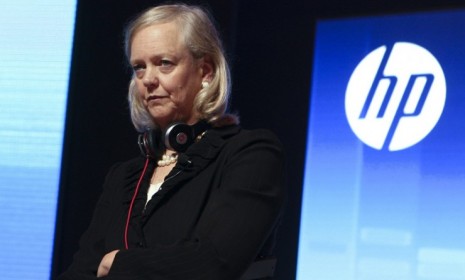Hewlett-Packard's Meg Whitman: Has her turnaround strategy failed already?
The computer giant is bleeding money, sparking criticism that Whitman has failed to adapt to a rapidly changing tech industry

A free daily email with the biggest news stories of the day – and the best features from TheWeek.com
You are now subscribed
Your newsletter sign-up was successful
This week, computer giant Hewlett-Packard announced that it had lost $8.86 billion in the third quarter, a record for the 73-year-old company. The loss — the latest in a string of bad news for the company, whose stock is down 32 percent this year — raised serious doubts about CEO Meg Whitman's turnaround strategy. Upon taking the helm in September 2011, Whitman rejected her predecessor's plan to spin off HP's personal computer and printer businesses in order to focus on software and IT services, a strategy IBM pursued with great success. Whitman decided to keep HP intact, pledging to retain its status as the world's No. 1 maker of personal computers, while simultaneously developing the company's other businesses. Has Whitman's strategy failed?
Yes. Everything is going wrong: The fact is "that it's tough to be in the PC business these days, especially if you're a decades-old American company, and it's not going to get easier any time soon," says Paul Vigna at The Wall Street Journal. HP "completely missed" the "rapid move" to smartphones, and its "PC business is under assault from all sides." In addition, its recent acquisitions of EDS and Autonomy, both of which were meant to drive the transition to software and IT services, have turned out to be disasters. "The path out from this PC manufacturing morass, toward the IBM model, is long and murky," and Whitman has "got her work cut out for her."
"Hewlett-Packard faces long and troubling turnaround"
The Week
Escape your echo chamber. Get the facts behind the news, plus analysis from multiple perspectives.

Sign up for The Week's Free Newsletters
From our morning news briefing to a weekly Good News Newsletter, get the best of The Week delivered directly to your inbox.
From our morning news briefing to a weekly Good News Newsletter, get the best of The Week delivered directly to your inbox.
The strategy was ok; the execution was poor: HP saw "the competitive changes coming," but made a mistake by purchasing EDS and Autonomy, says Robert Broens at Seeking Alpha. "Rather than driving internal change," HP snapped up a raft of promising companies, including 3Com, Palm, 3PAR, and ArcSight. The "massive acquisition spree has resulted in a net-debt position of $20 billion, a sizable amount for a shrinking and less profitable company." The latest quarterly report does not inspire hope for a "short term rebound."
"Hewlett-Packard — Whitman is cleaning up, taking an almost $1 billion charge"
Whitman should split up the company: Whitman must do "something radical," such as selling off "some of HP's largest pieces," says Quentin Hardy at The New York Times. HP has "built up such a huge presence" in PCs and printers that it's difficult for its other businesses, "even one worth hundreds of millions and growing like a weed," to have much impact on HP's bottom line. Given the way smartphones, tablets, and cloud computing have changed the industry, it's likely that "PCs, printers, and servers will not come back the way HP needs." Time for some of those units to go.
"The hard choices ahead for HP"
A free daily email with the biggest news stories of the day – and the best features from TheWeek.com
-
 Quiz of The Week: 14 – 20 February
Quiz of The Week: 14 – 20 FebruaryQuiz Have you been paying attention to The Week’s news?
-
 The Week Unwrapped: Do the Freemasons have too much sway in the police force?
The Week Unwrapped: Do the Freemasons have too much sway in the police force?Podcast Plus, what does the growing popularity of prediction markets mean for the future? And why are UK film and TV workers struggling?
-
 Properties of the week: pretty thatched cottages
Properties of the week: pretty thatched cottagesThe Week Recommends Featuring homes in West Sussex, Dorset and Suffolk